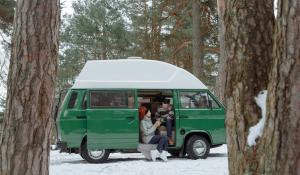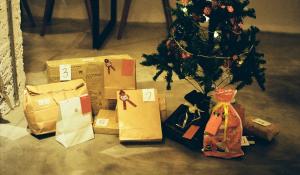
Njau Recycling and Income Generating Group, The Gambia
Miranda Paul just returned from three weeks in Africa, where she was arranging Fair Trade contracts with different artisan groups for Worldgoods, her Fair Trade store in Green Bay, Wisconsin. As she traveled through The Gambia, a small country in West Africa, she was struck and saddened by the amount of garbage she saw on the streets. But what was even more shocking was the abrupt difference she saw in the village of Njau: streets free of piles of garbage and plastic bags.
Paul soon learned that that difference was largely due to a community of women working together to rid their community of destructive garbage while earning an extra income to help support their families.
Njau Recycling and Income Generating Group was formed in 1997 by a Isatou Ceesay, a Gambian woman, and Peggy Sedlak, a Peace Corps volunteer. Ceesay and Sedlak saw that Njau was being overwhelmed by plastic bags, which had been brought into the country and were being used widely at markets. Without a proper system for managing waste, villagers simply discarded the plastic bags on the ground, creating an environmental crisis.
“Plastic bags are a big problem in The Gambia,” says Cessay. “There is no proper way to dispose of them, they litter the environment, and they are sometimes eaten by animals, causing serious problems for the animals.”
In a community dependent on livestock and agriculture, animals and crops were inexplicably dying. When butchers cut into dead goats, they found plastic bags in their stomachs, and farmers were pulling bags out of their soil and from around the roots of their scarce plants.
“In addition to hurting animals and the environment,” says Paul, “Malaria rates were going up, because all of the litter was collecting standing water where mosquitoes could breed.”
Sedlak heard about an artisan group in Senegal who learned to make purses out of discarded plastic bags, and she spent some time with them to learn the trade and bring it back to The Gambia. For Ceesay and the other women of Njau, who had been searching for solutions to the plastic bag problem, using the bags to earn an extra income seemed the perfect solution. They began the cooperative in 1997 as a group of five—now the cooperative has 69 members, all of them women. Members collect discarded plastic bags from the street, cut and wash them, and weave them into colorful change purses and larger bags. Working under a Fair Trade model, the women are paid a living wage for their work, and are paid in advance of product shipment. Weavers use the extra income earned from weaving purses to send their children to school, pay for medical treatment, or save money for years of drought.
“In this region of The Gambia, which is extremely rural, most households are earning only $40 every year from their crops, which are their main form of sustenance,” says Paul. “Having an extra source of income is essential for them to save money and send their children to school.”
In addition, says Paul, “Not only have over 69 women have now been taught the skill of weaving purses from recycled bags, but perhaps even more importantly, they are educating each other about impacts of their work on the environment, the animals, and the health of their community.”
The women make coin purses, cosmetic bags, and shoulder bags—a weaver will use between 10-30 plastic bags on each project. Depending on demand, women in the group make between 50 and 200 bags every month, removing hundreds of littered plastic bags from the streets.
“The environment is clean now, it’s a big improvement from ten years ago,” says Mombay Ceesay, who weaves shoulder bags. Ceesay is 70 years old, and has seen her village go from “clean to dirty to clean again.”
“The whole country is looking at us, and they haven’t been able to do what we have done. Our women are working very hard [to clean up our environment],” Ceesay says proudly.
In fact, the women in Njau have been so successful in using their craft to clean up the community that they have run out of plastic bags to use. The cooperative has now set up collection boxes in neighboring villages to obtain plastic bags for their projects. And according to Paul, there are three other villages waiting to start similar projects as soon as consumer demand for the finished purses increases.







